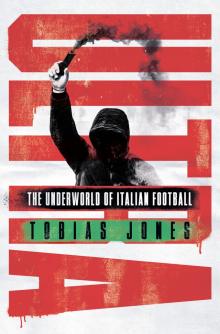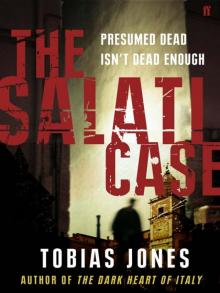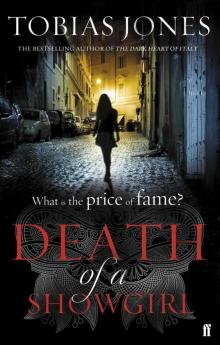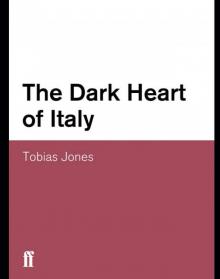- Home
- Tobias Jones
The Salati Case Page 2
The Salati Case Read online
Page 2
‘He had just come to see my mother in Sissa for the day.’
‘Sissa? That where you’re from?’
‘Right. She had driven him back to the station, dropped him there. I think that was another reason it hurt her so much. She blamed herself for not staying with him on the platform until the train came. As if you had to wait with a twenty-year-old. He would have thought it ridiculous, and so, in other circumstances, would she. But because she never saw him again, she felt it was her fault that she had just dropped him there.’
‘What time, do you remember?’
‘She said it was twenty minutes before the ten thirty train.’
‘And she drove off as he went to buy a ticket?’
‘Sure.’ He said it like he was still defending her.
‘Where will I find Anna?’ I changed tack.
‘I told you, Rimini.’ Salati’s tone had altered now. He clearly felt he alone was left to defend his family’s honour.
‘Any address?’
‘I’ll go find it.’ Salati stomped out to a back room and I looked at Laura, the young assistant. She had come back with two plastic thimbles of coffee. She looked at me and held the tray out.
‘Thanks.’
Salati returned with a piece of paper: ‘Via dei Caduti, 34. Rimini.’ He took the other coffee and smiled at the girl.
‘What were you doing’, I caught Salati’s eye, ‘the night Ricky disappeared? 24 June, wasn’t it?’
Umberto looked at me and laughed nervously. He was
about to say something, but then wiped down his moustache with his thumb and his forefinger and looked at me again. ‘You don’t waste time do you?’
‘Who were you with?’
‘Roberta.’
‘Your wife?’
He nodded. ‘My ex.’
‘Anyone else with you two that Saturday night?’
‘Just the two of us. I think she was due that weekend, or the one after. I can’t remember. We were just sitting there at home waiting.’
‘Your first?’
‘Yeah. Daniele.’
‘How many you got?’
‘Two boys.’
‘They still in the city?’
‘No. She took them back to Traversetolo when we split.’
‘Why was that?’
‘Why did she go to Traversetolo? That’s where her parents were from.’
‘No, why did you split?’
‘Roberta and I?’
I threw my chin into an upward nod.
‘She didn’t give a reason. Just said our marriage was over.’
He didn’t look particularly wistful about the separation. If there was any pain there, I guessed Laura eased it nicely. He seemed like so many of the middle-aged men I met in this city: a financial success and a family failure. One out of two wasn’t bad, I always thought. I would settle for one out of two.
I looked around the shop one last time. I turned over one or two labels. The prices were written by hand with an ink pen.
Salati saw me and took a shirt out of my hands and rubbed the cloth between his thumb and forefinger and started explaining the quality of his stock. His fingers looked, like him, slightly chubby. He obviously liked the finer things in life. He was a bon viveur, but then everyone was around here.
‘I’m going to make some enquiries’, I said, ‘and come back to you. Buongiorno.’
I walked out quickly. I didn’t like getting sucked into idle conversation with suspects. As soon as they offered you something, they would be asking for something in return. I heard Salati shouting goodbye to my back as if I were one of his customers, but by then I was back in the fog, enveloped in its icy white cold.
I crossed the road and walked towards Borgo delle Colonne. It was one of the few colonnaded streets in the old city. Protected from the rain, and close to the inner ring road, this was where the city’s prostitutes used to wait for their clients at night. It had been a bohemian haven when I had moved in here ten years ago, but the whole area was now being made ‘signorile’ and the prostitutes had been moved on to the motorway slip-roads. I missed their ugly honesty.
I walked up to my flat and sat at my desk. I rested the phone between my jaw and ear as I dialled the familiar number of the carabinieri.
‘Dall’Aglio? It’s Castagnetti.’
‘Good morning.’ He paused. ‘What do you want?’
‘I’m reopening a case. The disappearance in 1995 of a young man called Riccardo Salati.’
‘Silvia’s son?’
‘Exactly. You knew her?’
‘Vaguely. I heard she died last week, is that right?’
‘Yeah. It’s about the will. This boy disappeared in 1995. It would have been the Questura that dealt with it.
‘I remember. And what do you want?’
‘The name of the officer who took the report, his present posting, and any documentation which you might have in the records regarding the case.’
‘That all?’ He laughed. ‘It’s very busy here, I doubt anyone will have time to look into it until this evening. I’ll get someone on it when I can, and I’ll call you back by the end of the day.’
It went on like that for an hour. I phoned everyone I thought necessary. I phoned the town hall to ask if I could distribute the photocopies of the missing boy. I had to fax my request, so I typed up a letter. I made a note to ask Umberto Salati or Crespi for a photograph. I phoned every school in the city until I found out which ones Riccardo had attended. I phoned the secretaries to arrange visits.
On a whim I decided to phone the only doctor listed for Sissa. A secretary answered the phone and eventually put me through to the doctor. I introduced myself and the man started buttoning up.
‘An investigator you say?’
‘Sure. I’m after just a couple of—’
‘I can’t tell you any details of any of my patients. You understand, confidentiality …’
‘Even the ones who are dead?’
The man didn’t say anything and I pushed it.
‘Silvia Salati.’
‘Silvia? What do you want to know about her? She only died last week.’
‘How?’
‘How did she die?’ The man breathed out loudly. ‘Nothing confidential about that. It was her lungs. She had been a smoker all her life.’
‘Nothing unexpected?’
‘I told her thirty years ago it was going to happen.’
I thanked him and put my finger on the phone cradle and lifted it again. I listened to the dialling tone, thinking about what to do next. I opened my diary and found the number for the library.
Long beeps followed long silences.
‘Emeroteca,’ said a young woman’s voice.
‘Have you got La Gazzetta from the last few days?’
‘Sure.’
‘Open shelf?’
‘Sure.’
‘You’re open all morning?’
‘Until five tonight.’
I dropped the phone in the cradle, stood up and pulled on my jacket. I walked the back way, along Viale Mentana and Viale Piacenza, coming at the library through the Parco Ducale. It was a small building, but quick and efficient. A girl, the one I had spoken to by the sound of her Roman accent, fetched the two Gazzettas published over the weekend and passed them to me in a pile the size of a child’s mattress.
I took them to a desk and laid them out in front of me. I took the Saturday edition and opened up the paper.
It was winter and the sports section was full of calciomercato: the transfer gossip surrounding the big teams. All the important clubs and names were in bold so that you could read all the likely deals in a few seconds.
I turned over another page and saw a wall of faces staring back at me. These were photographs of the people who had died in the last few days. La Gazzetta must have been making a mint out of mourners. I knew how much each inch cost from when I had lost a friend a while back. The necrologi were money for old rope.
Most of the photographs looked as if they were taken when the deceased were in middle age and they made the paper like a throwback to the 1970s. There was something about the faces, the thickness of the glasses and the length of the hair, which looked out of date. Alongside each photograph or name were expressions of mourning from relatives and friends.
There was no mention of Salati. She had probably died too late on the Friday for anyone to publish a mourning notice on the Saturday. I took the Sunday paper and flicked through it to the pages of the dead. Almost a third of a page was dedicated to her. There were thirty or forty rectangular inches of sympathy from relatives and friends, each announcing their deep regret. Everywhere the name Silvia was written in bold like one of those footballers about to be transferred.
There was a photograph of her, a black and white shot. She looked purposeful: a thin necklace around a tight jumper. A good-looking woman with a determined mouth.
I read through the names of those who had publicised their sense of loss. They were just meaningless names to me but I would get copies. My work was all about methodology. I would cut out every mourning notice and arrange them in some kind of alphabetical order. Many of the mourners wrote only first names, so it wouldn’t be an authoritative index of her kith and kin, but it was the closest I could come up with for now.
I walked to a side room where they kept the day’s papers and found the Gazzetta. I went to the necrologi again. There were more mourning notices expressing regret at Silvia’s death, fewer this time, but there were still a dozen or so.
I scanned through them and immediately saw the name Riccardo. I read the sentence above it. ‘I am devastated by our loss. I will always carry you in my heart. Your son, Riccardo.’
I looked at the words again. ‘Your son, Riccardo’, it said.
My immediate reaction was the same as Umberto’s. Nobody comes back from the dead, I thought. That was make-believe. This read more like someone who wanted to cloud an inheritance.
But it clouded my case as well. And if this was a phantom Riccardo, I would then be chasing two ghosts instead of one.
I asked the girl to photocopy the Sunday and Monday necrologi. She looked at me and sighed quietly. ‘One euro and twenty please.’
I passed her some coins that she dropped in a wooden drawer. She put the papers under the machine and a lime-green light moved across the paper.
‘The papers from the 1990s, are they back there as well?’
‘La Gazzetta?’ she said over her shoulder.
‘La Gazzetta, summer of 1995.’
‘It’s on film. Which months do you want?’
‘June, July, August.’
She gave me the photocopies and then opened the front desk and went back into the stacks. She came back with three large rolls of film and walked me over to the old-fashioned machines for viewing. She put one roll into position and fixed the other end into a slot and ran it forwards. She flicked a switch and the film was projected on to a large screen.
‘Backwards, forwards,’ she said, showing me the buttons for scanning through the month’s editions.
I thanked her and she walked back to her desk. I was both expectant and subdued. There might be something here that could give me some background, but it would probably just be a waste of time. Most of my work involved wasting time.
I started on 24 June. I went through the paper scanning the headlines. The first few pages were normally national and international news. I turned to the inside pages that ran small stories about what was going on in the city.
On 29 June I saw a small paragraph in a side-bar of information about shop opening hours and parking discounts. There was no photo and no byline. It was an appeal for information: SISSA MAN MISSING, ran the headline:
Riccardo Salati went missing on Saturday 24 June. He was last seen waiting for the Rimini train on platform two of the railway station. Anyone with information is asked to contact Colonello Franchini at the Questura.
I wrote down the name Franchini and quickly moved to the subsequent papers.
I went through the next two months but there was nothing. I would have to talk to someone on the paper, one of the reporters, see if they remembered anything.
I gave the rolls of film back to the girl and walked out. Just as I was reaching the road my phone started tickling my leg.
‘Castagnetti, it’s Dall’Aglio.’
‘That was quick. Any news?’
‘Not really. There wasn’t an investigation as such, because there was never a crime, not that we knew of.’
‘So who was Franchini?’
‘How did you get his name?’
‘Saw one of his adverts in La Gazzetta.’
‘Right. He registered the boy’s disappearance. It was more a bureaucratic mechanism than the beginning of an investigation. That’s the only thing I found, the report. Once he was reported missing some photographs will have been distributed and advertisements will have been placed in the local press. But there’s nothing here in our records.’
‘Who was Franchini?’
‘He was one of the commanders when I arrived. Retired now.’
‘No relative of Piero Franchini?’ It was always worth trying to make connections. Piero Franchini was a town councillor. Had been for as long as I could remember.
‘Not that I know of.’
‘And what was the word on him?’
‘How do you mean?’
‘You know, what did they say about Franchini?’
‘Franchini? A bit of a drinker.’
‘Isn’t everyone?’
‘He was straight if that’s what you mean. Straight as a Roman road. Never a hint of association with anything other than the force and his family.’ Dall’Aglio was always quick to defend his uniform.
‘Where can I get hold of him?’
‘He moved out to the hills.’
‘Anything a bit more precise …?’
‘Listen, Castagnetti, I shouldn’t even have given you this much. You can find him easily enough. I’m not giving out addresses.’
‘The village at least.’
‘Medesano.’
‘OK. Thanks. I owe you one.’
‘You don’t owe me anything. I don’t trade favours because they become like money. People want more and more of them. I just render public what I decide is in the public interest.’
‘You’re a good man,’ I buttered.
‘I only ask that you keep me informed of your investigation.’
‘Of course.’
I drove over to Medesano. It was a town I knew a bit. A girl I used to know had friends out there.
It was a small place. There weren’t many bars and only one or two were open. The first one I went into was full of early afternoon boozers. There were a few men playing cards on large, circular tables. Others were reading newspapers. The low ceiling was made up of foam squares resting on aluminium runners. A fruit machine chimed from a far corner where a wheezer was dropping his coins. The room smelt of men: aftershave and grappa, coffee and sweat.
‘You know a man called Franchini?’ I asked the barman.
‘Sat over there.’ The man pointed at a large newspaper. All I could see were fingers holding the edge of the pages.
‘Small world,’ I said.
‘Small village,’ he corrected.
I went round the side of the paper and looked at the man. He looked jowly and tired. He was one of those men who are so big they snore even when they’re awake. There’s something about retired cops I find melancholic. It’s as if once they leave the service their whole life is meaningless. Franchini was wearing a suit as if he couldn’t face wearing anything else, but it was all creased like it was the only one he had left.
I took my coffee over. ‘Colonello Franchini?’
He looked up, startled by being given his rank.
‘My name’s Castagnetti. I’m working on a case you left open way back.’ I looked at the man’s face that had dropped into a serious, def
ensive scowl. ‘You remember Riccardo Salati?’
He almost closed his eyes and stared at me as if he resented the disturbance. ‘Rings a bell.’ The words came out as a single sound.
‘Went missing in 1995.’
‘Right,’ he said unconvincingly.
‘The boy was catching a train back to Rimini, you remember?’
The man was nodding slowly now. ‘And he never arrived. I remember. I only remember because that woman kept hassling me for years afterwards to investigate this or that.’
‘Which woman?’
‘It was his mother, lived out in Sissa.’
‘She won’t be hassling you any more,’ I said, looking at him.
‘She copped it?’
‘Died last week.’
‘That why it’s being reopened?’
‘Distribution of the estate,’ I said, nodding.
Franchini glazed over like he was missing his old job. ‘And you’ve been hired to find the corpse?’
‘Something like that.’
‘Buy me a drink,’ he growled, ‘and we can talk about it.’
I lifted my chin at the barman and shouted for two grappas. The man popped the cork off a half-empty bottle and poured the water-like liquid into two shot glasses. He brought them over.
Franchini slugged it as soon as it was in front of him. I looked at him as his head went backwards. The underneath of his chin was stubbly, like he couldn’t be bothered to shave properly. There were grey clumps of wiry beard poking out between the blood vessels.
He put down his glass and stared at it. ‘She was obsessed by it poor woman. Anyone would be, but there was nothing I could do. He was a young lad. Early twenties. Had a woman and a kid in Romagna somewhere.’
‘All news to me. I haven’t seen the file.’
Franchini fixed me with a stare. ‘There isn’t one. He was reported missing, and that was that in those days. Nowadays they would spend all day printing off letters to relatives to keep them informed of the lack of progress. We let it drop. The way that woman went on at me, you would have thought I didn’t care. I cared too much, that was what my wife always used to say.’
I nodded and let the grappa touch my upper lip. It was a powerful poison.
‘I didn’t ignore any leads,’ Franchini looked at my glass, ‘it’s just that there weren’t any. There was no evidence that anything untoward had happened to him. Truth told, it wasn’t the first time in his life he had gone absent without leave.’

 Ultra
Ultra The Salati Case
The Salati Case Death of a Showgirl
Death of a Showgirl The Dark Heart of Italy
The Dark Heart of Italy